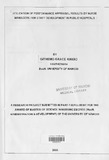| dc.contributor.author | Githemo, Grace K | |
| dc.date.accessioned | 2013-05-23T11:53:55Z | |
| dc.date.available | 2013-05-23T11:53:55Z | |
| dc.date.issued | 2006 | |
| dc.identifier.citation | M.Sc. N (Administration & Development) | en |
| dc.identifier.uri | http://erepository.uonbi.ac.ke:8080/xmlui/handle/123456789/24851 | |
| dc.description | Master of Science in Nursing | en |
| dc.description.abstract | Performance appraisal is a structured formal interaction between a subordinate and
a supervisor that usually takes the form of a periodic interview (annual or semi
annual) in which the work performance of a subordinate is examined and discussed,
with a view to identify strengths and weaknesses as well as opportunities for
improvement and skills development.
Objective of this study
The objective of this study was to establish whether nurse managers utilize
performance appraisal results for staff development in public hospitals.
Study design and method
This was a descriptive cross sectional study that was carried out in five public
hospitals that included Mbagathi, Thika, Kiambu, Mathari and National Spinal Injury
hospital for a period of 12 weeks from April to June 2006 at a cost of Ksh.147, 704.
Stratified random sampling was utilized to select the study subjects. A total of 301
Junior nursing staff (both enrolled and registered) plus 51 nurse managers
participated in this study. Two structured self administered questionnaires and a
checklist (appendix 81 and BII) were used to collect the data which was summarized
using descriptive statistics. Chi square test of significance was used to test the
relationship among various study variables and hypothesis testing.
Results
The study findings revealed that 64% of the nurse managers had been trained on
performance appraisal process out of which 60.6% were trained during the basic
training, and only 23.5% had been trained on use of performance appraisal results.
The data showed that there was a significant relationship between promotion and
being appraised (p=0.003).There was no significant relationship between being
appraised and staff deployment. (p=0.207) and neither with in-service training
attendance (p=0.207). Continuing medical education attendance (p=0.055), receiving
reward for good performance (p=0.921) nor receiving verbal or written
commendation for work well done (p=0.294).
Conclusions
Thestudy findings rejected the null hypothesis that nurse managers utilize
performanceappraisal results for staff training, deployment and motivation but failed
to reject the use of results for staff promotion. Hence performance appraisal results
are mostly used for staff promotion and are not generally considered in staff
deployment, training or motivation.
Recommendations
Nurse Managers should be trained on use of performance appraisal process
and use of results for staff development now that the government of Kenya
has introduced performance contract and is putting a lot of emphasis on
results.
A policy should be formulated to ensure that nurse managers are at higher
designation than the junior nursing staff for effective use of appraisal results. | en |
| dc.description.sponsorship | University of Nairobi | en |
| dc.language.iso | en | en |
| dc.title | Utilization of performance appraisal results by nurse managers for staff development in public hospitals | en |
| dc.type | Thesis | en |
| dc.description.department | a
Department of Psychiatry, University of Nairobi, ; bDepartment of Mental Health, School of Medicine,
Moi University, Eldoret, Kenya | |
| local.publisher | Department of Medicine, University of Nairobi | en |

